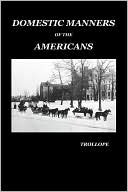

 |

|

The average rating for Domestic Manners of the Americans based on 1 review is 4 stars.
Review # 1 was written on 2014-07-01 00:00:00 Melissa k Hayes Melissa k HayesThis travel book, by a sharp-eyed Englishwoman who wrote almost two centuries ago, not only shows us a young America which has changed greatly, but also reveals an archetypal American citizen who has changed much less than the country itself. In 1827, her husband's law practice having failed, Frances Trollope set sail for the mouth of the Mississippi with three of her six children, hoping to relieve the pressure of family debt either by communal refuge or commercial enterprise. She quickly abandoned hopes for an interracial utopia in the Tennessee forest'the first sight of the Nashoba Community filled her with "desolation"'and soon traveled up the Ohio to seek her fortune in Cincinnati. Although she did not admire the "Queen City of the West"'an "uninteresting mass of buildings" with poor drainage--she soon devised a stratagem for supporting her family there. She joined forces with Joseph Dorfeuille, the curator of a private natural history museum, who for the last three years had sought, with little success, to appeal to Cincinnati's best society. To save his beloved museum, he lowered his cultural standards and decided to add a waxworks display. One month after this addition, Fanny Trollope arrived. Inspired by La Divina Commedia, Mrs. T. convinced Curator D. to sponsor what she called "The Infernal Regions"'located heterodoxically in an upper story of the museum'an exhibit populated by a waxwork Lucifer (with rolling eyeballs), waxwork demons, real honest-to-god skeletons of executed criminals, and featuring'courtesy of a local special-effects man named Powers'a fountain of flame, a frozen lake surrounded by columns of ice, and an electrified grate which not only served to block off entrance to the exhibit but also gave the too eager observer a little shock from hell. Encouraged by success, Mrs. Trollope invested her profits in the "Trollope Bazaar," a proposed cultural center where she planned to feature concerts, exhibits of art, lectures, and a market for luxury goods. Alas, the conception was too ambitious, the building itself too extensive; the goods Mr. Trollope sent from England were seized for debt, and the Trollope family was bankrupt. Undaunted, Fanny, having borrowed money from friends, left Cincinnati for a tour of the eastern United Sates, determined to make her fortune by writing an account of her American travels. She found many vistas and prospects to admire'the grand expanse of Washington, the pastoral beauties of Virginia, the imposing grandeur of Niagara'and more aspects of the American character to deplore. Americans hated the book, but the English loved it; a great success, it endowed the Trollope family with a new fortune. Fanny went on to write more than forty books, most of them novels'her son Anthony, author of Barchester Towers, no doubt used her as a model for industry--but no subsequent book of hers was ever quite as successful as "Domestic Manners." Published a mere decade after Jane Austen's death, "Domestic Manners of the Americans" is reminiscent of the apparently artless yet pruned prose of the Regency, not yet overrun by the luxuriance of Romantic style. It is well written, witty and restrained in its manner, and apt in its observations. The America Mrs. Trollope observes in 1828 is--except for the particulars--much like America today. She depicts a society marred by a greed unchecked by responsibility and an ostentation uninfluenced by elegance, low tax rates resulting in civic discomforts, a lack of appreciation and support for the arts, rudeness toward public figures including the president (Jackson), an addiction to low forms of popular media (newspapers), and an inordinate influence on public opinion by evangelical preachers of the most sensational, revivalist type. She observes a congress obsessed with state's rights, unwilling to allocate money for the least improvement (roads, canals, drainage), and a government capable of acting without honesty or integrity ("Indian Removal"). She describes a people whose belief in equality produces a contempt for both service and immigrant poverty but no repudiation of slavery, and generates an unwillingness both to dispense charity with generosity and to receive it with grace. Above all, she shows us an American people who, delighting in their unique marvel of a democracy, celebrate their particular freedom of speech by demanding that anyone who expresses the slightest criticism of their country should either cease immediately or be prevented from defaming what is--indisputably--the Greatest Country in the World. |
CAN'T FIND WHAT YOU'RE LOOKING FOR? CLICK HERE!!!